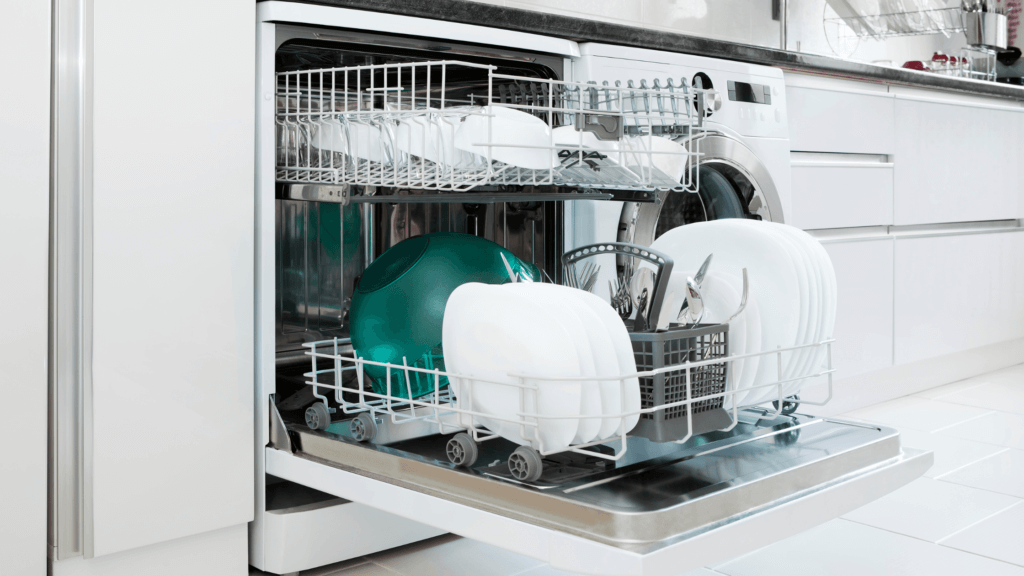It’s a nightmare scenario: you open your dishwasher to empty it and discover something rotten inside. Your tableware is dirty; there are no clean plates, bowls, cups, or glasses. It appears that the cycle has not been running at all. Everything you own stinks and is covered with grime. Even worse, it appears that your dishwasher has stopped working. You’ll have to get a new one when that time comes. If yours has already broken, you might be curious as to what caused the damage. If you’re wondering if the time was correct (or if it should have lasted longer! ), you’ve come to the proper spot to find out. Dishwashers are among the hardest working home appliances. Dishwashers are used at least once weekly in most American households, and in many, it is used nightly. Considering the degree of use, it’s helpful to get an idea of how long a dishwasher lasts before deciding whether to invest in a replacement or continue with repairs.
How Long Dishwashers Last
Dishwashers generally work for nine to ten years. Dishwasher quality, how often it is used, and the quality of the water in the home all contribute to the appliance’s lifespan.
Keeping potentially damaging objects out, filling the dishwasher properly, and regularly cleaning, maintaining, and repairing the appliance may all help owners get the most use out of their dishwasher until it finally gives up.
Factors Affecting the Lifespan of a Dishwasher
Several factors affect how long a dishwasher will last. If you have a dishwasher and you want it to endure as long as possible, you should consider these considerations.
- A dishwasher’s durability is heavily dependent on the caliber of the components used in its construction. High-quality dishwashers, such those with stainless steel inside and sturdy plastic exteriors, last far longer than their lower-quality counterparts.
- The longevity of your dishwasher is directly proportional to the amount of use you give it and the care you provide it on a regular basis. The longer and more frequently you use the dishwasher, the faster it will wear down. Problems may be avoided and service life can be extended with routine maintenance such filter cleaning, debris removal from spray arms, and inspection for and replacement of worn components.
- The longevity of your dishwasher may be affected by the water quality you use in it. Limescale and mineral deposits can form on the dishwasher’s parts if you use hard water, which is water with high quantities of minerals like calcium and magnesium. This accumulation can eventually decrease performance and shorten its lifespan. The harmful effects of hard water can be reduced by the intermittent use of a water softener or descaler.
- Dishwasher longevity can also be affected by user behavior, such as the sorts of objects washed and how they are loaded into the dishwasher. Long-term harm can occur if the dishwasher is overloaded or if unsafe objects are placed in it. Loading the dishwasher properly in accordance with the manufacturer’s instructions can help ensure that the machine’s parts are not overworked.
- Electrical problems, such as power surges or voltage fluctuations, might harm the dishwasher’s electrical parts. If you want to preserve your dishwasher and extend its life, you should install a surge protector or a voltage stabilizer.
You can extend the life of your dishwasher and prevent premature breakdowns by keeping these things in mind and taking the necessary precautions. We’ll go over some of the warning indications that your dishwasher may be on its last legs, as well as the typical lifespan of a dishwasher, in the following sections.
Quality of Materials Used
The durability of a dishwasher relies heavily on the high-quality components that go into its assembly. Better able to endure the inevitable wear and tear of repeated usage, as well as damage and degradation. Some considerations regarding dishwashing materials are as follows:
- Dishwasher interiors are generally made of either plastic or stainless steel. Interiors made of stainless steel are noted for their longevity and resistance to corrosion, stains, and smells. They are resistant to heat and wear and tear well over time. Plastic interiors, on the other hand, are more affordable, but they may show more signs of wear and tear over time, especially if they are scratched by abrasive cleaning products or kitchen tools.
- The outside shell of a dishwasher may be fabricated from stainless steel, plastic, or a hybrid of these two materials. While plastic exteriors are less expensive, they may not be as durable as stainless steel exteriors in the long run. Selecting an external material that works within your price range and satisfies your taste in design while also taking its expected lifespan into account is essential.
- The dishwasher’s racks and utensil baskets are what keep your dishes and silverware in place while they’re being washed. Coated metal or high-quality plastic would be ideal for fabricating such components because of their durability and resistance to corrosion. If you want to reduce the likelihood of breakage and maximize the longevity of your dishwasher’s racks and baskets, it’s worth you to invest in a model with sturdy construction.
- Seals and gaskets are critical parts of a dishwasher because they prevent water from leaking out. Seals of higher quality should be constructed of rubber or silicone since these materials are more resistant to wear and tear. Leaks caused by old or damaged seals can cause serious problems for the dishwasher’s electronic and mechanical parts. The integrity of the dishwasher may be preserved by routine inspection and, if necessary, replacement of seals and gaskets.
- Dishwasher control panels and buttons are often constructed of plastic or other touch-sensitive materials. Make sure the materials used to construct the control panel are robust enough to survive frequent usage, as well as being impervious to moisture and wear. The mechanism of a good button should be sturdy enough to withstand repeated pushing without becoming loose or unresponsive.
The quality of the dishwasher’s components is a crucial factor to think about when making a purchase. A dishwasher made from higher-priced but more durable components can save you money in the long run by lowering the frequency with which it will need to be repaired or replaced.
Tips for Extending the Life of Your Dishwasher
You can keep your dishwasher running well for many more years if you fill it properly. You should also regularly clean, maintain, and repair the dishwasher.
Wash Correct Items Only
Use the dishwasher to clean your pots, pans, and other kitchen utensils. Do not wash things like automobile components, unclean sports equipment, or dirty candlestick holders. Some non-kitchen objects, such as toothbrush holders, pet bowls, and human and animal hair brushes and combs, can be cleaned in the dishwasher.
Use the Dishwasher Properly by Loading
Always remember to fill the dishwasher properly. Lighter goods go on the top rack, heavier ones on the bottom, and everything should have plenty of room. Keep to the order established by the tines of the racks. Items will be evenly spaced if they are placed exclusively in specific areas.
Do the Dishwasher Cleaning
Maintain a regular cleaning schedule for the dishwasher. In a bowl that can go in the dishwasher, pour in one cup of white vinegar. Get the dishwasher empty. Without spilling the contents, carefully place the bowl on the uppermost dishwashing rack. Complete one entire loop. Once a month, you should clean the dishwasher.
Dishwasher Upkeep
Preserve the condition of the dishwasher by your own upkeep.
- Check the dishwasher’s drainage and leaks from time to time.
- Empty the garbage disposal.
- Keep the air vents clear and open by checking them often.
- If your dishwasher is still leaving dishes filthy, try cleaning the spray arms using a fine, flexible wire to remove any mineral deposits or debris.
- Take out the filter and clean it with a toothbrush dipped in warm, soapy water.
Make Dishwasher Repairs
Resolve the dishwasher’s difficulties before they worsen and cause irreparable harm to the appliance. The majority of dishwashing problems are fixable by the owner.
Most householders should be able to repair a float, seal a leaky door, or replace a drain using just rudimentary tools and supplies ordered over the internet. You can even replace the heating element in a non-heating dishwasher on your own.
Red Flags That It’s Time to Buy a New Dishwasher
- Dishwasher body or other integrated elements have developed rust; this is a serious problem that typically necessitates a new appliance. Some pieces, such racks and tines, may be removed and replaced if they rust.
- The dishwasher, bathtub, or door acquired cracks that can no longer be patched.
- Dishwashers manufactured before the introduction of the EnergyStar program’s guidelines for energy efficiency are inefficient and wasteful. Dishwashers that are old and wasteful of electricity are another potential deal breaker.
- Dishwasher repairs are intended to keep the machine functioning for as long as possible at the lowest possible cost, but they still cost more than buying a new dishwasher. When fixing the machine would cost more than buying a new one, you should get a new one.
- When a dishwasher reaches 10 years of age or more, it’s probably time to replace it, even if it’s still doing a good job of cleaning. Damage to the kitchen’s floor, subfloor, cabinetry, and ceiling from a dishwasher leak may be disastrous and costly.
Repair vs. Replace the Dishwasher
When a dishwasher breaks down or stops cleaning properly, the decision of whether to fix it or replace it arises.
Do you have the ability to do routine upkeep and fixes?
Repairing the dishwasher might be less expensive than replacing it if you are able to handle it yourself and don’t mind putting in the time and effort. As long as the dishwasher is still effective in its intended function, it is more cost-effective to keep fixing it.
How much do expert repairs cost every year, and how much does it cost to replace?
Standard 24-inch built-in models from major brands with basic features start at roughly $400 to $500. High-end name-brand machines with features like bespoke front panels, ultra-quiet operation, and concealed controls can cost upwards of $2,300 for a new dishwasher.
Investing in a new dishwasher, at a cost of about $800, should be weighed against the cost of repairs you’ll need to make each year. If you have to spend between $200 and $400 every time the dishwasher breaks, it’s probably time to get a new one.
Do you intend to sell the home and when?
When thinking about whether to stay in the house or sell it, how do you account for the dishwasher’s estimated 10-year lifespan?
The machine should be replaced every five to ten years, depending on how long you want to remain in the house. You may want to keep servicing and fixing the unit if you want to sell the house sooner.
The benefits to resale are something your realtor can help you evaluate. To sell an old dishwasher together with the house or to install a new one for the buyer’s advantage, which may help sell the house, that is the question.
Should You Fix Your Dishwasher or Replace It?
That is mostly determined by price. A professional repairman may advise you on whether it’s more economical to fix the appliance or buy a new one after looking it over. Major damage to the plumbing or electrical outlets would necessitate a new dishwasher even if it were still reasonably fresh. However, with the addition of modern tubes, filters, and knobs, some aging devices may function as well as new ones.
If a dishwasher is not water or energy efficient, it may be time to replace it regardless of its current condition. If you want to see the difference in your water and power bills, try going without the gadget for a month. You might be surprised by the difference. For long-term savings on energy costs, think about switching to a replacement that has earned the Energy Star label.
Conclusion
A dishwasher is a helpful gadget that shortens the time spent washing dishes. By learning what variables impact its lifespan and then taking the necessary steps to care for and maintain it, you can make this indispensable kitchen gadget last for many more years. In this post, we looked at how variables like material quality, frequency of usage and maintenance, water quality, and user behavior might affect a dishwasher’s longevity. Cleaning the filter and spray arms on a regular basis and using only high-quality detergents are just a few of the steps you can take to extend the life of your dishwasher and keep it running smoothly.
We also looked at dishwashers’ normal lifespan, which we found to be between 9 and 12 years. This is a preliminary estimate, though, and your actual costs may be more or lower depending on the details of your dishwasher and how you often use it. Reduced cleaning effectiveness, excessive noise, leakage, and frequent repairs are all warning indications that your dishwasher may be on its last legs. Our advice on how to load the dishwasher, how often to clean the filter, how to spot and replace damaged parts, and which detergent is best for your water type can help your dishwasher last for many years. To maximize your dishwasher’s lifespan, always use full loads, take use of energy-saving settings, and plan for regular expert repair.
You may improve the efficiency and longevity of your dishwasher by learning about and then using the aspects that determine its lifespan. Dishwashers can be expensive, but with proper care and maintenance they can last for many years, saving you money and ensuring that your dishes come out clean and shiny every time.
FAQ
How frequently should a dishwasher be replaced?
Most dishwashers will need some sort of maintenance or repair during the first five years, so plan on replacing it after 10 years. If your dishwasher is more than ten years old, you’d be better off replacing it than having it repaired.
Should you spend money on dishwasher repairs?
Most dishwashers will need some sort of repair within the first five years, so it’s worth it to mend one if it’s less than ten years old. However, if your dishwasher is older than 10 years, it is recommended that you replace it.
When does a dishwasher stop working properly?
Signs that your dishwasher is on its last legs include corrosion, cracks, or repair costs that exceed the appliance’s value. Water pooling in the bottom of the dishwasher when you open it after a cycle is another telltale indicator that you need to replace the appliance.



